Mpox
Mpox Outbreak Update
-
On November 15, 2024, the California Department of Public Health (CDPH) confirmed the first reported case of clade I mpox in the United States.
-
On August 14. 2024, the World Health Organization declared the monkeypox outbreak in the Democratic Republic of the Congo (DRC) and a growing number of countries in Africa a public health emergency of international concern.
-
The risk of an mpox outbreak in the Unites States is very low. Risk to United States from clade I mpox outbreak in Central and Eastern Africa | CFA: Qualitative Assessments | CDC
-
Most of the current and previous mpox cases in the U.S. are occurring in social networks of men who have sex with men and individuals with multiple or anonymous sex partners. However, it is not limited to these individuals.
What is mpox?
Mpox (formerly known as monkeypox) is a disease caused by infection with a virus, known as Monkeypox virus. This virus is part of the same family as the virus that causes smallpox.
Symptoms: People with mpox often get a rash, along with other symptoms. The rash will go through several stages, including scabs, before healing. Mpox is not related to chickenpox.
Contagion: Mpox is not as contagious as COVID-19 or the flu. The risk of spread is highest during oral sex, anal sex, vaginal sex, and other intimate contact such as hugging, kissing, cuddling and massage.
How mpox is spread:
Mpox is most often spread through:
- Direct, prolonged contact with a rash or sores of someone who has the virus
- Coming in contact with clothing, bedding or other items used by the person with the virus
- Respiratory droplets passed through prolonged face-to-face contact over several hours
How to protect yourself from mpox:
- Get Both Doses of the Mpox Vaccine
Vaccination is an important tool in preventing the spread of mpox. The vaccine may still protect against severe illness, hospitalization, and death. Get vaccinated with both doses of the vaccine for the best protection.Contact your healthcare provider about mpox vaccination, testing, and treatment or visit the Cook County Health Mpox webpage. Another resource for finding vaccine providers is CDC’s Mpox vaccine locator tool . For mpox treatment, visit the Cook County Health Ruth M. Rothstein CORE Center website - Take Precautions
Consider altering your behavior temporarily while there is an uptick in cases:- Exchange contact information with any new partner so you can follow up with each other, if needed.
- Talk with your partner about any mpox symptoms and be aware of any new or unexplained rash or lesions on either of your bodies, including the mouth, genitals (penis, testicles, vulva, or vagina), or anus (butthole).
- If you or your partner recently had mpox symptoms or a new or unexplained rash anywhere on your body, do not have sex. Cover the rash with clothing and see a healthcare provider.
For more information:
- Mpox vaccination basics: https://www.cdc.gov/mpox/vaccines/
- CDC Mpox information: https://www.cdc.gov/mpox/
How we help
Since the beginning of the 2022-2023 mpox outbreak, Cook County Department of Public Health (CCDPH) has been closely monitoring the situation and raising public awareness about the recent uptick in cases in our area, with messaging about signs and symptoms, prevention (e.g., getting vaccinated, safer sex, avoiding social gatherings), testing, isolation, home care, and treatment.
CCDPH’s communicable disease program investigates potential cases of mpox and close contacts and provides technical assistance to medical providers so that people get the treatment they need.
CCDPH currently has a large supply of vaccine and redistributes vaccine and treatment to medical providers in suburban Cook County. CCDPH also collaborates with other local certified health departments to ensure residents have access to vaccine and treatment.
Total Cases
Hospitalizations
Deaths
Residents Vaccinated
Mpox in Suburban Cook County
Cook County Department of Public Health (CCDPH) is tracking mpox cases and contacts in suburban Cook County. The risk to the general public is currently low. The graphs below contain information about confirmed mpox cases in suburban Cook County by age, race, sex, ethnicity and sexual orientation. Data are updated on the first Monday of the month.
Date Last Updated: July 8, 2025.
Data are provisional and subject to change.
Cases by Age Group
| Age Group | Count | (%) |
|---|---|---|
| 0-17 | 2 | (1.3%) |
| 18-24 | 12 | (7.7%) |
| 25-34 | 57 | (36.8%) |
| 35-44 | 52 | (33.5%) |
| 45-54 | 25 | (16.1%) |
| 55-64 | 7 | (4.5%) |
| 65+ | 0 | (0%) |
| Total | 155 | (100%) |
Cases by Sex
| Sex | Count | (%) |
|---|---|---|
| Male | 148 | (95.5%) |
| Female | 7 | (4.5%) |
| Total | 155 | (100%) |
Cases by Race/Ethnicity
| Race/Ethnicity | Count | (%) |
|---|---|---|
| Hispanic/Latinx | 56 | (36.4%) |
| Black, not Hispanic/Latinx | 52 | (33.8%) |
| White, not Hispanic/Latinx | 36 | (23.2%) |
| Other, not Hispanic/Latinx | 5 | (3.2%) |
| Asian, not Hispanic/Latinx | 5 | (3.2%) |
| Unknown | 1 | (0.6%) |
| Total | 155 | (100%) |
Cases by Sexual Orientation
| Sexual Orientation | Count | (%) |
|---|---|---|
| Lesbian or Gay | 59 | (38.3%) |
| Unknown | 43 | (27.7%) |
| Bisexual | 28 | (18.1%) |
| Straight, Not Gay or Lesbian | 22 | (14.2%) |
| Other | 3 | (1.9%) |
| Total | 155 | (100%) |
Frequently Asked Questions
FAQ fact sheets and social media graphics can be downloaded in English and Spanish by clicking on the Communications Materials tab.
Mpox is a rare disease caused by infection with the mpox virus. Mpox virus is part of the same family of viruses as variola virus, the virus that causes smallpox. Mpox symptoms are similar to smallpox symptoms, but milder, and mpox is rarely fatal. Mpox is not related to chickenpox.
Infections with the type of mpox virus identified in this outbreak—the West African type—are rarely fatal. Over 99% of people who get this form of the disease are likely to survive. However, people with weakened immune systems, children under 8 years of age, people with a history of eczema, and people who are pregnant or breastfeeding may be more likely to get seriously ill or die.
Although the West African type is rarely fatal, symptoms can be extremely painful, and people might have permanent scarring resulting from the rash.
Below are some examples of what mpox looks like. For more information please visit the CDC website
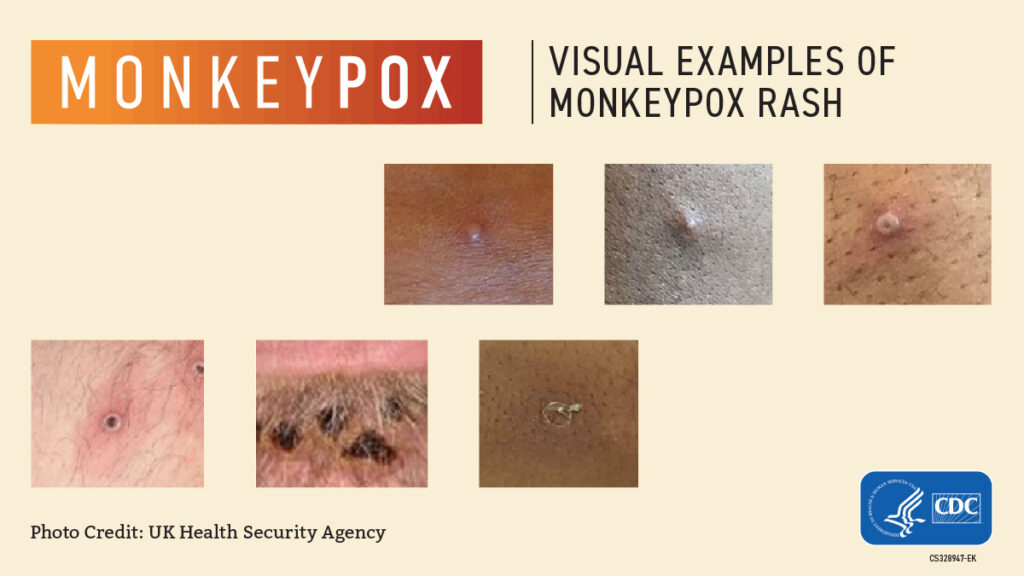
Anyone can get mpox. As of 8/18/2022, vaccine eligibility criteria for mpox vaccination will include anyone (including students enrolled in universities/colleges), who meets EITHER of the following criteria AND has not previously been infected with mpox:
- Anyone who had close contact (e.g., household members with close physical contact or intimate partners) with someone diagnosed with mpox regardless of sex, gender, or sexual orientation.
- Gay, bisexual, and other men who have sex with men and transgender persons who are sexually active.
If this sounds like you, or you have symptoms of mpox, contact a healthcare provider. If you don’t have a healthcare provider, call Cook County Health at 312-864-0200 or the HIV Resource Hub at 844-482-4040. CDC recommends vaccination within 4 days from the date of exposure for the best chance to avoid getting mpox.
- Fever
- Chills
- Headache
- Muscle aches
- Fatigue
- Enlarged lymph nodes
- Rash on face, body or genitals
Please note: Some individuals may only get a rash and no other symptoms.
If you have fever, chills, headache, muscle aches, fatigue, enlarged lymph nodes, rash or sores on face, body or genitals:
- Stay home and away from other people (isolate).
- Schedule an appointment with a healthcare provider. If you don’t have a healthcare provider, call Cook County Health at 312-864-0200 or the HIV Resource Hub at 844-482-4040.
- Wear a mask and cover rash (if present) when you go to the appointment.
- If you have a rash or sore available for testing, the healthcare provider will call the health department for next steps. The healthcare provider will take a sample from the rash or sore to send to a lab.
- Wear a mask and keep rash covered while in public and continue to isolate while waiting for test results.
Mpox can spread in various ways. Mpox can spread person-to-person through:
- Direct contact with the infectious rash, scabs or body fluids
- Respiratory secretions during prolonged face-to-face contact or during intimate physical contact such as kissing, cuddling or sex
- Handling personal items like bedding, towels, laundry, utensils, fetish gear and sex toys
No. mpox is spread by direct contact with:
- Infectious rash, scabs or body fluids
- Respiratory secretions shared during prolonged face-to-face and physical contact (kissing, cuddling or sex)
- Personal items like bedding, towels, laundry, utensils, fetish gear and sex toys.
- If vaccination is given 4–14 days after the date of exposure, it may reduce symptoms, but may not prevent mpox infection.
- CDC recommends vaccination within 4 days from the date of exposure to avoid getting mpox.
- The sooner an exposed person gets the vaccine, the better.
Side effects are common and usually mild. Most people have redness, swelling and pain where they got the shot. You may feel tired, have a headache and muscle pain.
- Most people recover from mpox without needing treatment.
- There is an antiviral drug called Tecovirimat (TPOXX) that can be given to people who are more likely to get severely ill, like patients with weakened immune systems, genital or eye lesions, or are pregnant.
- TPOXX must be prescribed by a physician in coordination with the local health department (CCDPH).
- For more information, talk to your provider or visit the CDC website at: https://www.cdc.gov/poxvirus/monkeypox/clinicians/Tecovirimat.html
Please visit the Illinois Department of Public Health website for school guidance and daycare guidance, including patient isolation procedures and prevention and control measures.
People who think they have mpox or have had close personal contact with someone who has mpox should visit a healthcare provider to help them decide if they need to be tested for mpox. If they decide that you should be tested, they will work with you to collect the specimens and send them to a laboratory for testing.
If you don’t have a healthcare provider, call Cook County Health at 312-864-0200 or the HIV Resource Hub at 844-482-4040.
Cook County Health is offering mpox vaccination at several health centers, including suburban Cook County locations in Arlington Heights, Blue Island and North Riverside. Learn More.
Click on the “Get Care” tab above for a list of CCH and CCDPH vaccination partners.
In suburban Cook County, we are distributing vaccine to healthcare providers who reach eligible populations. Please be patient. There is currently not enough vaccine for all those who qualify to receive a dose, but this is expected to improve as more vaccine becomes available.
If you meet the eligibility criteria under "Should I get vaccinated for mpox?" you can:
- Contact your healthcare provider. (Note: If the provider is not familiar with mpox, encourage them to visit our website for more information.) OR
- Click the "Get Care" tab to see the list of healthcare providers who are offering JYNNEOS™ vaccination in suburban Cook County. (Note: Supplies are limited. Appointments may be required.).
- If you are a Chicago resident, please click here for more information.
Communications Materials
Mpox Communications Materials - in English



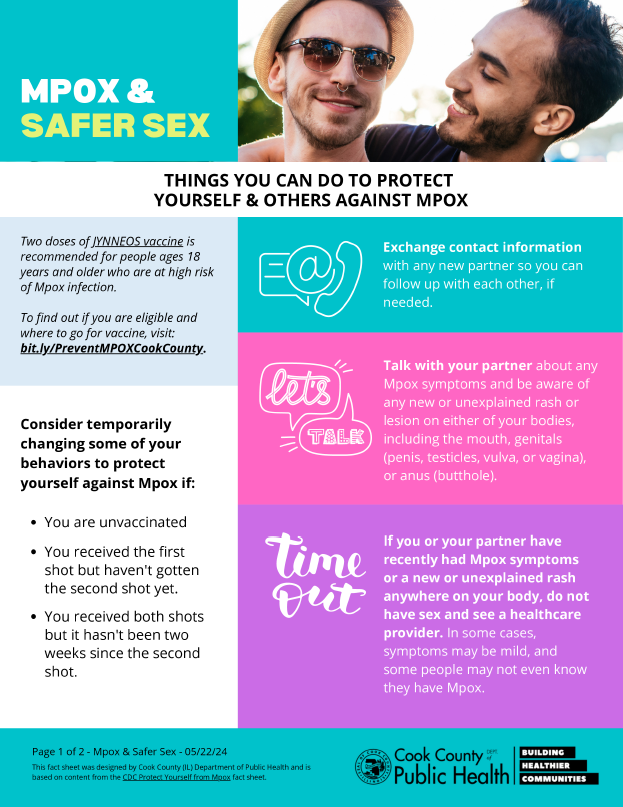
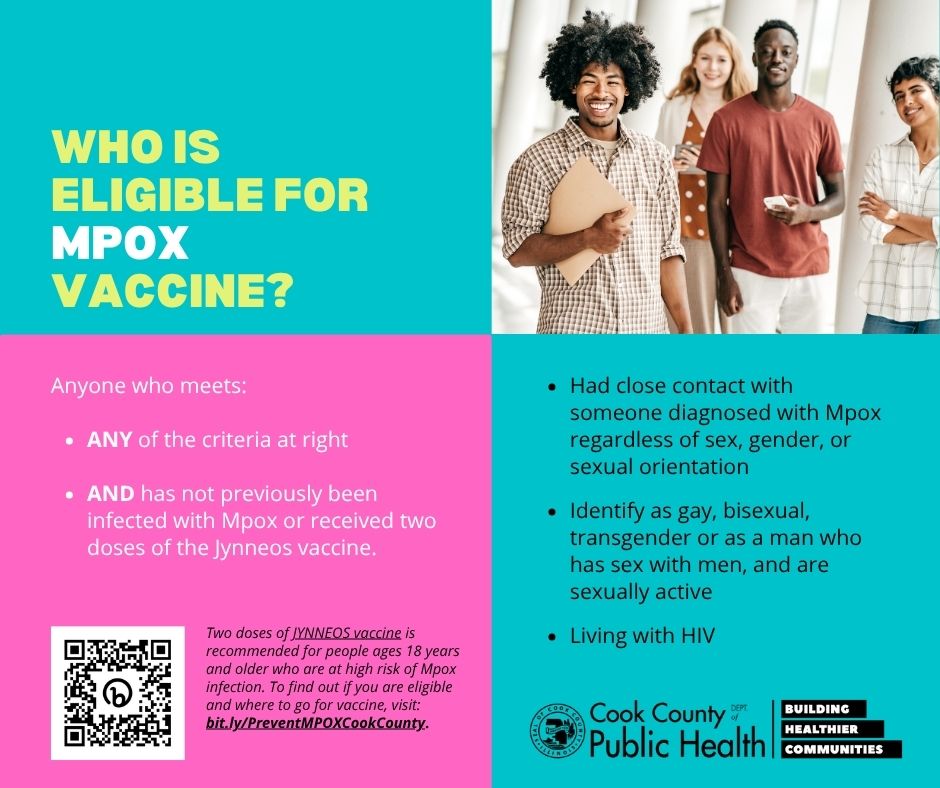
Mpox Communications Materials - in Spanish
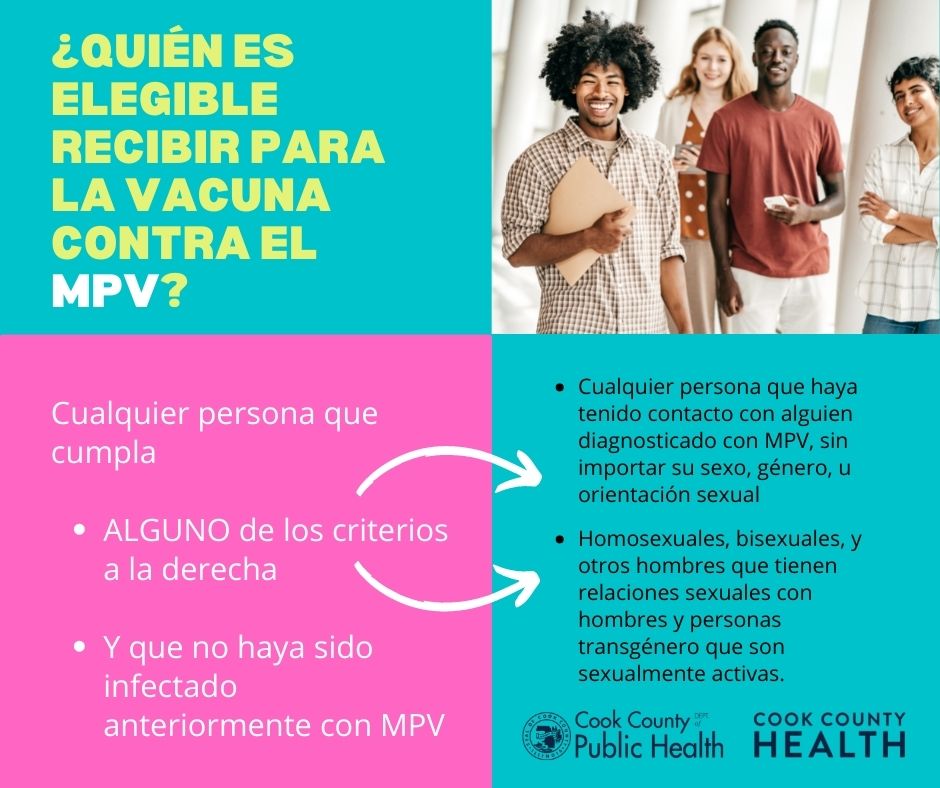
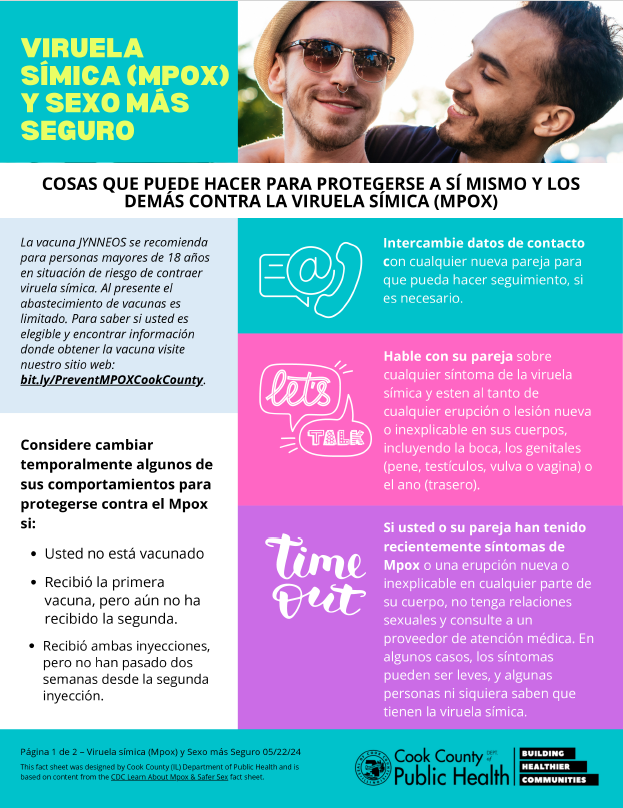
Partners
The mpox outbreak is escalating rapidly, and healthcare providers and schools are asked to establish plans for their organizations. Below are links to information for each of these partner groups.
Updated July 9, 2025, 5:28 PM
